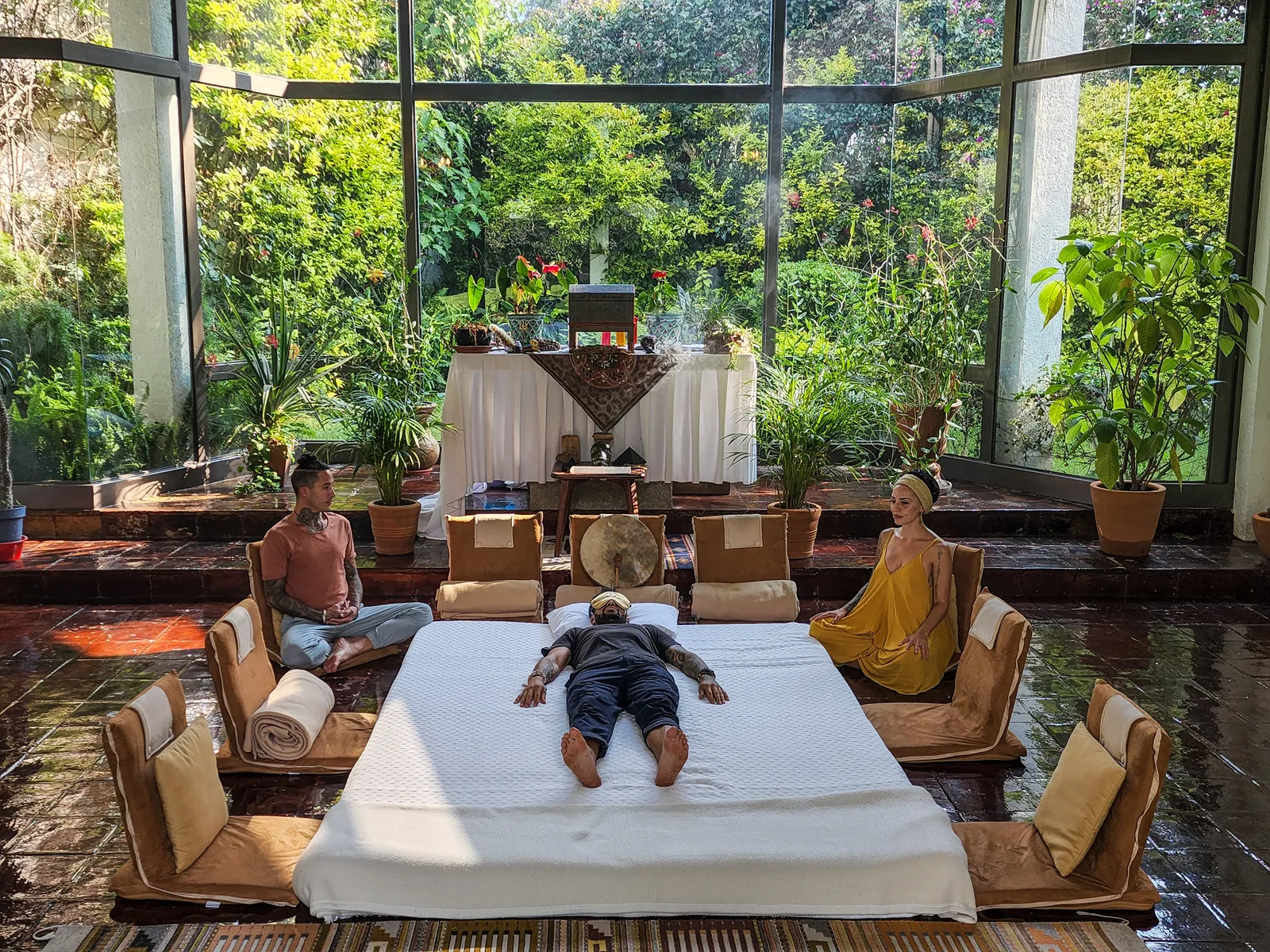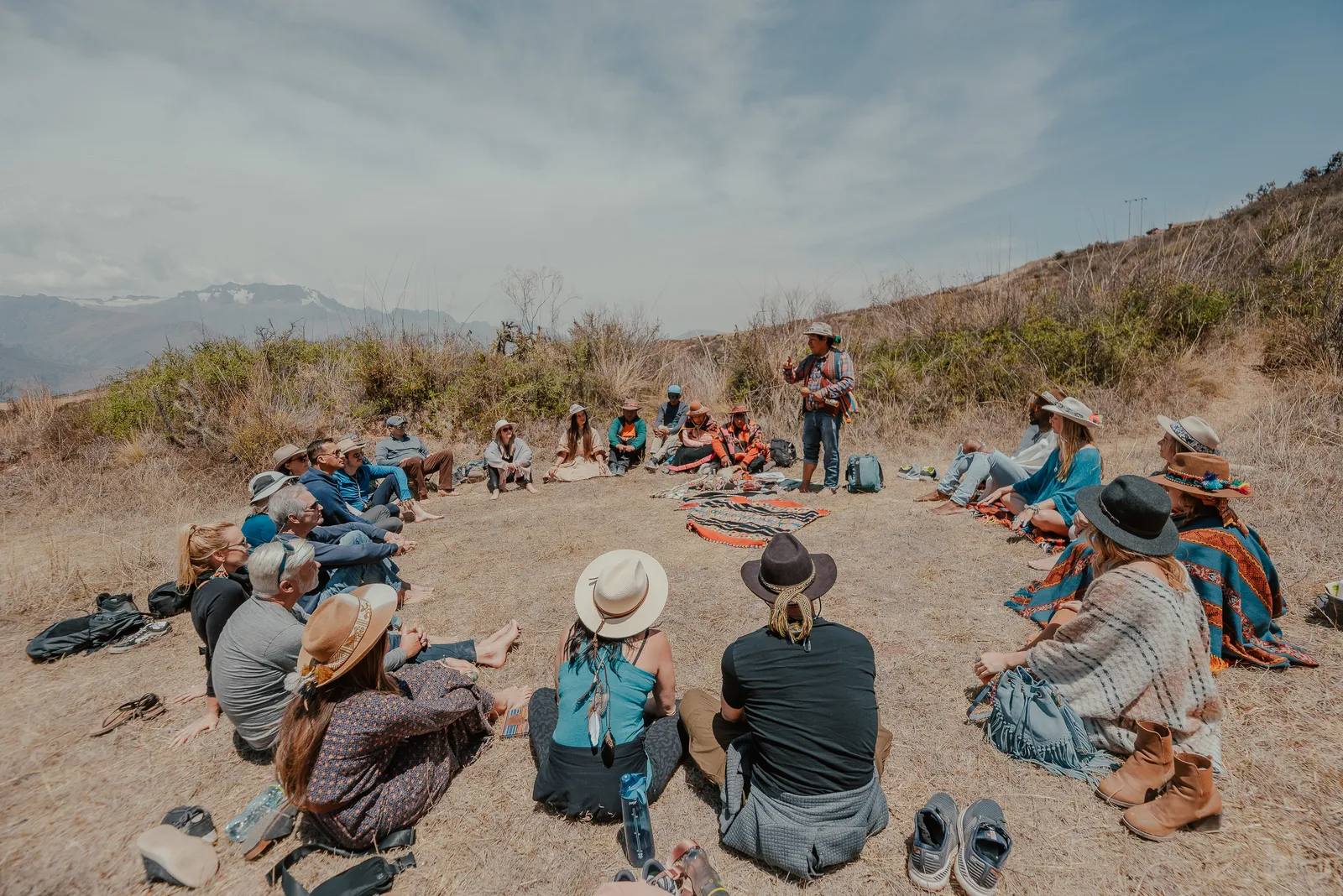Photo by Arther Elgort, Vogue, June 2003
It’s 7:50 a.m. in the misty mountain town of Tepoztlán, and I’m fighting the morning chill with a fluffy white poncho wrapped around my shoulders. I just finished a ritual of breathwork and yoga with my fellow retreat participants and am now anxiously awaiting my next appointment: a journey with 5-MeO-DMT, a compound known as the God Molecule in psychedelic circles for its ability to elicit a non-dual state of consciousness, also known as ineffability.
I asked to be the first of our group of seven to go, mostly out of fear. When I’m summoned to enter the ceremonial space, Joel Brierre and Victoria Wueschner—CEO and founder and head of education, respectively, of Tandava Retreats—are ready for me, each seated on opposite sides of a mattress topped with fresh linens and blankets, where I’ll lay for my ceremony. After briefly introducing what to expect during my experience, Wueschner comes to my side and hands me a pipe. She tells me to breathe in the vapor within it and hold it in my lungs for as long as I can. I do as instructed and lay back. Seconds later, I lurch forward and scream in panic, reaching for Brierre on my right-hand side, asking him to save me. I tell him I don’t want to die. Then, as suddenly as my fear arrives, it dissolves, and I experience a full and total ego death. What happens next is almost impossible to describe—which, I learn, is common for participants of 5-MeO-DMT journeys. But as a writer, it has left me somewhat stumped.

The 5-MeO-DMT journey I experienced at Tandava Retreats is part of a global wave of growth in the psychedelics industry, both from a business perspective and from a therapeutic standpoint. According to Data Bridge Market Research, the psychedelic market is slated to reach $10.7 billion by 2027, up from $3.8 billion last year, which coincides with the Global Wellness Institute’s latest report showing the wellness tourism market is projected to double by 2027 to become a $1.4 trillion sector. When analyzed together, the statistics show incredible opportunity at the intersection of psychedelics and tourism, especially in the form of retreats. But why are people drawn to them in the first place? When looking at the data, the answer seems to be mental health.
Deriving from the parotoid glands of the Sonoran Desert toad, also known as the Bufo Alvarius toad, 5-MeO-DMT, and its synthetic derivative, is unlike any other psychedelic in the world. While in prior ayahuasca, mushroom, and peyote ceremonies—which all lasted around six hours each—I was an active participant in the journey, 5-MeO-DMT showed me I was merely a passenger. My waking experience with 5-MeO-DMT lasted no more than 30 seconds. The total ceremony, so I’m told, was just under an hour. Though not typically known to elicit visual effects, my experience with 5-MeO-DMT did include a glimmer: For an instant, I saw what appeared to be the tiniest molecule in existence, and somehow, this same molecule was also the expansiveness of the universe. It was both terrifying and euphoric and also incredibly brief—like I had finally been let in on the great cosmic joke and the opportunity to grasp the meaning of enlightenment, even if only temporarily.
But it also left me in a deeply vulnerable state, one that led to semi-sleepless nights for nearly two weeks due to reactivations, a feeling of falling into the medicinal experience (aka dying) again. It mostly came between 2 a.m. and 4 a.m., when I hit REM sleep, the closest we are to death. The vision repeated: I was a silhouette in the shape of a shooting star, suspended in the cosmos until I completely and utterly dissolved. Like a shooting star, I catapulted into everything, and also nothing. I would wake up short of breath, gripping onto my bed to find my balance. I live on the eighth floor of an apartment building, so you can imagine how disorienting this was—especially as REM sleep plays a huge role in memory consolidation and emotional processing.
In a recent 5-MeO-DMT study, the vast majority of participants who had been diagnosed with depression or anxiety reported an improvement in their symptoms. Findings from a similar study showed a single dose of the molecule produces persistent reductions in depression, stress, and anxiety, as well as increases in awareness, life satisfaction, and mindfulness. Though I felt quite shaken up after my experience, once the dust had settled and my healthy sleep patterns returned, I felt more joyous, playful, and hopeful than I ever had in my life. It seems even more people want in on the benefits, too; since Brierre and Wueschner began offering retreats in Tepoztlán in 2018, they’ve experienced a sevenfold increase in bookings. “The world is changing, and the way we traverse it is, too,” says Brierre. “People are seeking connection to themselves, their fellow humans, and to nature—psychedelic wellness retreats offer all of this.”
But with this boon comes a contradictory side, too, as some studies are finding that some psychedelic experiences can elicit negative responses. According to research conducted by Jules Evans of the Challenging Psychedelic Experiences Project, around two-thirds of 608 participants surveyed reported experiencing anxiety, fear, anger, low mood or depression, paranoia, panic attacks, shame, guilt, and resurfaced trauma, among other things, after taking a psychedelic, mostly psilocybin and LSD likely due to easier access. One-third reported their difficulties lasting longer than a year and one-sixth longer than three years. Only 8% of survey respondents had taken psychedelics in a therapeutic or clinical setting, which shows the importance of choosing the right facility while simultaneously proving harm can happen even in the safest of settings.
Beyond 5-MeO-DMT, interest in other psychedelic retreats has also increased, especially ayahuasca, which harbors DMT, a hallucinogenic known for its powerful psychoactive effect. Co-founder of The EAST Institute Lena Franklin—who offers 10-day experiences in the Sacred Valley of Peru—believes overall interest in psychedelic retreats is spiking because individuals are now desiring more out of life. These experiences could be the answer, as they rest at the intersection of mental health, travel, and wellness. “These medicines help us see who we actually are by allowing us to release the conditioning of who we were told we should be,” says Franklin. “There’s a deep collective desire for wholeness.” (Her views—and the benefits of ayahuasca, in general—are proven by several studies, including a report by the Journal of Affective Disorder Reports.)

According to a 2021 study in the New England Journal of Medicine, psilocybin, derived from psychedelic mushrooms, also shows promising results in terms of lowering rates of depression, anxiety, and addiction. Companies leading the field include Beckley Retreats and the Jamaican-owned ONE Retreats by Rose Hill, the largest natural psilocybin producer and the first legal exporter for both researchers and retreat centers. In 2023, ONE Retreats hosted four experiences, and now, due to demand, will host over 20 in the next year alone.
Still, because there’s little oversight of psychedelic retreats, there’s no governing body providing any safety regulations. It’s often left to retreat companies to build their own best practices, so it’s important to do your research and find the right facility for you—one that you trust. After experiencing the power of 5-MeO-DMT myself, it somewhat horrifies me to know there are untrained facilitators serving the medicine with no pre- or post-care offered to participants. It’s not something to take lightly, and it’s important to find a center like Tandava that not only has a thorough pre-screening process to ensure no participants have medical histories that could interfere with their experience, but also has secure parameters during the actual retreat in case of emergencies: additional facilitators, therapists, and even on-call nurses who can intervene if necessary.
Most psychedelic therapies are not legal in the Western medical model, though advancements are being made in countries where it is either legal or the lines are blurred: Mexico, Jamaica, Costa Rica, Netherlands, and Australia, the latter of which announced earlier this year that medicines containing MDMA and psilocybin will soon be permitted for certain therapeutic usage. Though the U.S. is expected to follow suit at some point, the timeline of legality remains uncertain. While psychedelic advancements continue, it’s important to consider what your intention with psychedelics actually is. In my experience, it doesn’t replace therapy or even cure us; oftentimes, it stirs up even more to work through than we had before the experience.
And so one of the reasons I felt so comfortable experiencing 5-MeO-DMT with Tandava Retreats is their deep belief in post-care: Each participant receives four complimentary sessions with a certified integration specialist following their experience. I was assigned to the therapist Otto Maier, who was also present during my retreat. While still at the center, I had a vision of butterflies flying out of my mouth, something I shared with Maier, who helped me understand the contours of my 5-MeO-DMT experience. “Typically, in dreams, the monarch butterfly is not only a nod to the life cycle, but to the individuality of our essence,” Maier told me. “It makes me wonder what lies beyond your writing—what beauty you withhold from your spoken word, and why?”
While I don’t believe psychedelic retreats are the answer to all the toils of the human condition, I do believe something as powerful as 5-MeO-DMT could change the way humanity moves through the world. My journey left me with many deep truths, namely, that separation is an illusion—and the realization of how extraordinary everyday life can be when viewed as miraculous. Unlike any other moment in my life, it allowed me to zoom out and see life from a macro lens, both in its unjust chaos and beautiful brilliance. It also made me realize why I’m drawn to psychedelics in the first place. I’m driven by a fascination with where each substance may take me, how deeply I can experience my own creativity and expansion, and what truths may be revealed if I fearlessly pursue a life beyond my comfort zone.
Call it a continued benefit of my 5-MeO-DMT experience or not, but two weeks after I returned home from Tepoztlán, one of my biggest dreams came true—I signed with my literary agent.
This article was originally published on Vogue.com.
